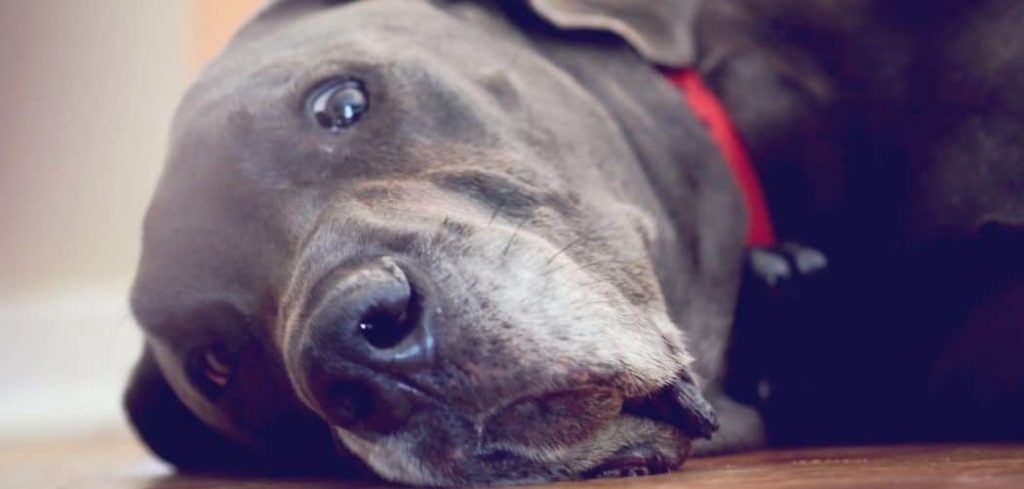It can be alarming to see mucus in your dog’s stool along with vomiting. These symptoms may point to an underlying digestive issue, or other health concern that should not be ignored.
We outline the possible causes of mucus in a dog’s poop and vomiting, what you can do at home, and when to seek veterinary help.
Mucus in Dog Poop and Vomiting — Why It Happens
Mucus in a dog’s stool combined with vomiting usually signals irritation or inflammation of the digestive system. Conditions such as infections, dietary indiscretion, parasites, inflammatory bowel disease, or more serious illnesses like pancreatitis can all be responsible.
Sometimes, stress or sudden diet changes may also trigger both vomiting and mucus in the stool.
While some cases may be mild and self-limiting, others can indicate a medical emergency that requires prompt attention.

Mucus in Dog Poop and Vomiting: Possible Causes
Dietary Indiscretion
Dogs often eat things they shouldn’t, from spoiled food to foreign objects. This can irritate the stomach and intestines, leading to vomiting and mucus-coated stool.
You may also notice diarrhea, loss of appetite, or lethargy. If a foreign object is stuck, the symptoms can escalate quickly, making this cause potentially dangerous.
Read more: Dog Diarrhea Mucus No Other Symptoms (When mucus alone should concern you)
Intestinal Parasites
Parasites like giardia, whipworms, or roundworms can inflame the digestive tract. This irritation often causes dogs to vomit and pass stool lined with mucus.
Some parasites are microscopic, so the stool may look normal apart from the slimy coating and occasional streaks of blood.
Untreated infestations can lead to weight loss, dehydration, and nutrient deficiencies.
Infections (Viral or Bacterial)
Viruses such as parvovirus or bacterial infections like salmonella can trigger both vomiting and mucus in the stool.
These conditions can be extremely serious, especially in puppies or dogs with weaker immune systems.
Along with vomiting and slimy stool, signs like fever, loss of energy, or refusal to eat may appear. Infections of this nature often require urgent veterinary care.
Inflammatory Bowel Disease (IBD)
Chronic inflammation of the digestive tract, commonly known as inflammatory bowel disease, can result in ongoing vomiting and stools containing mucus.
This is due to the irritation and disruption of normal digestion. Dogs with IBD may have fluctuating appetites, weight loss, and recurrent bouts of soft stool or diarrhea. Managing IBD usually requires long-term veterinary care and dietary adjustments.
Food Intolerance or Allergies
Some dogs develop sensitivities to certain ingredients, such as specific proteins, dairy, or grains.
This can upset the digestive system, leading to mucus in the stool along with vomiting.
Reactions may occur shortly after eating or develop gradually over time. Identifying and avoiding the trigger food can significantly improve symptoms, but it often requires guidance from a veterinarian.
Pancreatitis
Inflammation of the pancreas is a painful and serious condition. Pancreatitis often causes vomiting, diarrhea with mucus, abdominal pain, and a hunched posture.
Dogs may also appear weak or lose interest in food. Because pancreatitis can quickly worsen and lead to life-threatening complications, veterinary treatment is essential.
Read more: Mucus in Dog Poop and Diarrhea (Why it happens)
What to Do If Your Dog Is Experiencing Mucus in Poop and Vomiting
If your dog is otherwise alert and symptoms are mild, you can take steps at home to support recovery.
Withhold food for several hours to allow the stomach to settle, then reintroduce a bland diet of plain rice and boiled chicken in small portions.
Ensure your dog always has access to fresh water to prevent dehydration. Monitor closely for changes, keeping track of stool consistency and frequency of vomiting.
Avoid giving human medications, as many are toxic to dogs. If symptoms persist beyond 24 hours, veterinary attention is advised.
When to Call or Visit Your Vet
Seek immediate veterinary care if vomiting and mucus in stool are accompanied by blood, severe diarrhea, weakness, or refusal to drink water.
Puppies, senior dogs, and those with chronic health issues are at higher risk and should be seen promptly.
Persistent symptoms lasting longer than a day, or signs of abdominal pain such as whining, hunched posture, or refusal to move, also warrant urgent evaluation.
Quick action can make a significant difference in your dog’s outcome.
Read more: Dog Pooping Blood and Vomiting but Acting Normal (Why it happens)
Key Takeaway
Mucus in dog poop combined with vomiting can range from mild digestive upset to serious health conditions.
Staying observant and supportive at home is important, but knowing when to escalate to a veterinarian is crucial.
Trust your instincts—if your dog’s symptoms seem concerning, seeking professional care ensures they receive the right treatment and comfort as quickly as possible.
